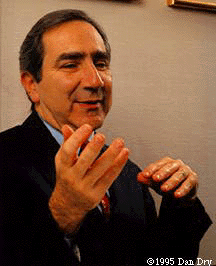
 The University of Chicago Magazine April 1995
The University of Chicago Magazine April 1995

I love it. The values of this place--a commitment to discovery and learning, the importance of intellectual community, a belief in the examination of ideas--all mean a great deal to me and are extremely nourishing.
The range of the job is enormous, from increasing my understanding of the work of the University to getting to know faculty, students, and alumni. Add in financial stewardship, fund-raising, and representing the University to the public--obviously, there is much to do.
Of all your responsibilities, what do you consider your overriding priority?
To help the University understand itself. What are we trying to achieve? What must we do to improve? We can too easily take for granted the character, hard work, and good fortune that have been responsible for our excellence. I have great faith that if we can pose the right questions and help our faculty, students, and alumni to understand what is possible, then we as a community will make choices that help us to grow stronger. The values of the individual members of our community are a great source of strength. My role is to help us transfer these values into collective will and collective action.
In February, the University's trustees voted to increase the Campaign for the Next Century's goal by $150 million, to $650 million. What prompted this decision?
The larger goal acknowledges needs that are absolutely imperative. We want to raise an additional $70 million for professorships and another $20 million for financial aid. This is lifeblood for a university that defines itself in terms of faculty quality and cares so deeply that the education it offers will remain available to those who would profit most from that education.
The new goal is also a commitment to meet some critical facilities needs. Although we've just opened two wonderful facilities--the Downtown Center, and the Biological Sciences Learning Center and Jules F. Knapp Medical Research Building--urgent needs remain, particularly in the area of campus life. As a first step, we've set a $20-million goal toward a substantial improvement of our athletic facilities.
Above all, the trustees' decision to raise the campaign's goal is a recognition that in order for the University to continue to satisfy its very high level of aspirations, fund-raising needs to be brought to a new level and be sustained at that level over the long run. This will be a challenge for us all, and I am heartened that the trustees, collectively and as individuals, have made such a strong commitment.
You took office at what you have characterized as a time of genuine financial challenge for the University. What effect will addressing those challenges have on Chicago's essential values?
This fall, three task forces were convened to explore issues related to education in the College, graduate education, and the quality of student experience at the University. These task forces are meant to help us distinguish both our basic values and those practices that are essential to the support of those values from what is merely familiar or comfortable.
Our essential values are bound up, of course, in the University's mission. At Chicago, we engage in discovery--particularly discovery that is fundamental or transcends disciplinary boundaries. We develop innovative ways of teaching and learning that emphasize basic principles and are adaptable to new discoveries. We seek to create and maintain the foremost intellectual community among universities, we foster scholarly discourse across disciplines, and we place great importance on being an intellectual community that brings together graduate and undergraduate students. In all these efforts, we demonstrate to the broader world the importance and value of discovery, learning, and intellectual community.
As a
